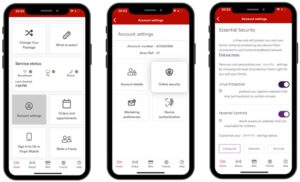- To help customers keep their connected devices safe, Virgin Media includes Essential Security – a cyber security protection service – within all broadband packages as standard and at no extra cost.
- The free Essential Security service automatically protects all devices connected to a customer’s home network, helping to keep them safe and secure.
- Customers have the option to upgrade to Advanced Security antivirus software, free for the first three months, to benefit from additional security features across an unlimited number of devices.
- Between June 2022 to May 2023, Virgin Media blocked 136 million* unsafe or harmful websites, 800k virus, malware and spyware risks and secured 4.9 million banking and shopping transactions with its Advanced Security service.
- Virgin Media O2’s Director of Connectivity, Gareth Lister, provides some useful tips to help people stay safe when connected.

With reliance on connectivity greater than ever and online scam attempts becoming increasingly hard to spot, Virgin Media O2 is going the extra mile to help its customers keep their devices safe and secure with Essential Security, a smart cyber security service included within all of its broadband packages as standard.
Customers can choose from two security offerings, ‘Essential Security’ which comes with all broadband packages as standard and at no extra cost, or ‘Advanced Security’, Virgin Media’s enhanced antivirus offering which protects an unlimited number of devices for just £3 per month (first three months free) or £30 per year.
Virgin Media’s Essential Security benefits include:
- Content filtering: Blocks scam and phishing websites.
- Data protection: Prevents malware and viruses from transmitting a customer’s data to scammers, hackers or phishers.
- Parental controls: Keeps the entire family safe online with customisable timers and limits, via My Virgin Media.
- Devices protected: Available on all devices connected to your home WiFi network.
Customers who choose to upgrade to Advanced Security can enjoy the first three months for free, with the service then costing just £3 per month or £30 a year thereafter, and can benefit from enhanced security features including:
- Remote device disruption: Ensures devices aren’t remotely accessed and controlled.
- Banking and shopping protection: Stops untrusted network connections while buying or banking online.
- Virus removal: Detects, scans and removes viruses alongside other malware that are already on the customer’s devices.
- Improved parental controls: Sets up parental controls per device, rather than using a blanket setting across all devices via My Virgin Media.
- On-the-Go protection: Provides constant 24/7 security on the go, regardless of the customer’s mobile network provider, if they are offline or if they connect to a different broadband connection.
- Devices protected: Available on an unlimited number of devices for total protection everywhere.
Between the summer of 2022 to 2023 alone, Virgin Media’s security tools blocked visits to 136 million unsafe or harmful websites; prevented customers from opening viruses, malware or spyware nearly 100 times a minute; and secured 4.9 million banking and shopping sessions.
This comes as Action Fraud report that a huge £890 million was stolen from Brits via cyber-attacks last year in the UK – which equates to an average loss of £4.5k per report of cyber-enabled crime**.
According to further research by Gov UK, Great Britain’s most common cyber threats are relatively unsophisticated and an estimated 95% of cyber-attacks succeed due to human error. This includes ‘active’ errors such as opening malicious email attachments and ‘passive’ errors such as using weak passwords***.
Virgin Media O2’s Director of Connectivity, Gareth Lister, provides some useful tips to help broadband users stay safe while online.
- Choose a strong password: Ensure you set a strong and unique password to avoid unintentionally putting your devices and personal information at risk. Research indicates that the UK’s most common password is “password” ****, so be a little more creative and try using a mixture of letters, numbers and symbols as well as avoiding use of the same password across your devices and accounts. It’s also best to avoid using personal information like names, addresses and birthdays as these can be predictable.
- Set up two-factor authentication: If a hacker did correctly guess a password, having two-factor authentication set up (i.e. a facial recognition or a text message code) will help to prevent them from accessing further information so it’s vital to add this extra level of security.
- Monitor the number of devices you connect to your home broadband: According to the Department for Science Innovation and Technology (DSIT), more than half of UK households now have a smart TV and voice assistant such as Alexa*****, meaning it’s becoming more common for cyber-criminals to attempt accessing smart household items and stealing private data. Try to keep track of the devices connected to your home broadband network and the level of security you have on these devices.
ENDS
Notes to Editor:
- *136 million unsafe or harmful website blocking based on Virgin Media Internet Security, now called “Advanced Security” PC users only between Jan 2023 – Dec 2023.
- **Research by Action Fraud Latest Cyber Crime Statistics from the UK [2024] (acora.one) measured the results between June 2022 to May 2023
- ***Research by Gov UK’s Department for Science, Innovation and Technology Cyber security breaches survey 2024 – GOV.UK (www.gov.uk) / Cybersecurity in the UK – House of Commons Library (parliament.uk)
press enquiries
press enquiries







